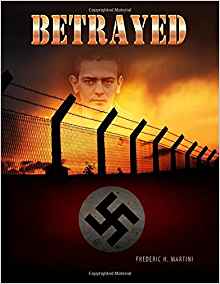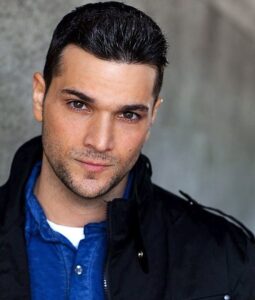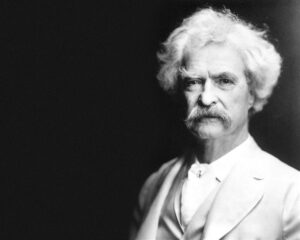
BETRAYED: Secrecy, Lies, and Consequences received a 4+ star review, making it an IndieReader Approved title.
Following find an interview with author Frederic H. Martini.
BETRAYED: Secrecy, Lies, and Consequences
What’s the book’s first line?
At 0230, Staff Sergeant Fred Martini was awakened by a sharp tap on the forehead and a bright flashlight in the eyes.
What’s the book about? Give us the “pitch”.
In 1944, 168 Allied airmen, including my father, were captured by the Gestapo, sentenced to death, and shipped by boxcar to Buchenwald Concentration Camp. Those who survived the beatings, starvation, and medical experimentation did so only because they were evacuated by the Luftwaffe a week before their scheduled execution. When these veterans returned to the US, the government officially denied their experiences, and the VA treated them as liars, grifters, or psych cases. The government classified and buried their records to protect an ongoing top secret program — Project Paperclip — that relied on Wernher von Braun, the Nazi engineer in charge of the V-2 rocket program. The rockets were assembled in an underground factory, the Mittelwerk, and von Braun selected slave laborers for that factory from the prisoner population at Buchenwald. While the government ignored or disparaged the accounts of the Buchenwald airmen, it promoted a fabricated history for von Braun and his associates.
What inspired you to write the book? A particular person? An event?
My father was one of the Buchenwald airmen.
What’s the main reason someone should really read this book?
The story demonstrates the potential consequences when intelligence agencies, operating unfettered and without oversight, make decisions about what is best for the country. In this case, the agencies involved either withheld information or lied to Congress, the President, and other federal agencies to further their own version of national security. It is also a reminder of how “truth” can be shaped by lying repeatedly over decades.
If they made your book into a movie, who would you like to see play the main character(s)?
Michael Buonomo as Fred Martini, someone like Rutger Hauer for von Braun
When did you first decide to become an author?
In 1979 I finished four years of travel and research in the South Pacific, and I was giving lectures on various topics to the public and to first year college students. I decided to put that material into a book that was published in 1984. A sales rep from the publishing company that owned that imprint approached me about writing a text for another course I was teaching. That book led to others. So I never made a conscious decision to be an author — it just sort of happened.
Is this the first book you’ve written?
No, I wrote a trade book on tropical islands, 10 textbooks, two atlases, and five clinical manuals before tackling Betrayed. But it was always on my “to do” list.
What do you do for work when you’re not writing?
I am now retired from teaching and have coauthors doing most of the revision work on the textbooks. So I guess I don’t have a “real job.” I still have research projects underway, but those are largely self-funded. So I keep very busy, but working for myself.
How much time do you generally spend on your writing?
That varies from day to day. I try to put in several unbroken hours every day when trying to get a plan for a project, and then put in full days in a push once I have a plan in mind that I can trust.
What’s the best and the hardest part of being an indie?
I am new to indie writing, but the main problem I’ve found is not having the marketing and travel budget and distribution support that many traditional publishers provide.
What’s a great piece of advice that you can share with fellow indie authors?
I will be better able to answer that question once I see how things work out with Betrayed since it is my first Indie book.
Would you go traditional if a publisher came calling? If so, why?
I would in this particular case, because promotional and marketing activities are essential to the goal I had when writing the book (see below). I think that my answer for the next book I am working on might be different.
Is there something in particular that motivates you?
The motivation for Betrayed is pretty straightforward. In 1993 and 1997, the House of Representatives passed resolutions correcting the official history, acknowledging the experiences of the Buchenwald airmen, and commending them for their service. Both times the resolutions were killed by the Senate Judiciary Committee. I’d like to see a similar resolution pass Congress before all of the airmen and their children pass away (only two of the airmen are alive today). The only way that will happen is if there is widespread public awareness of the disservice done to these veterans by the government they suffered to defend.
Which writer, living or dead, do you most admire?
That’s a tough call. Top candidates would be Mark Twain, Dave Barry, James Lee Burke, Ken Kesey, and Lee Child, each for different reasons.


